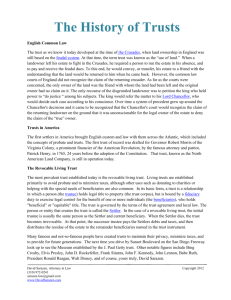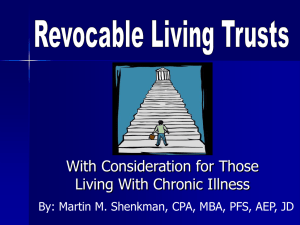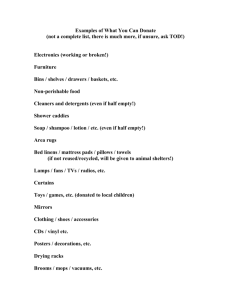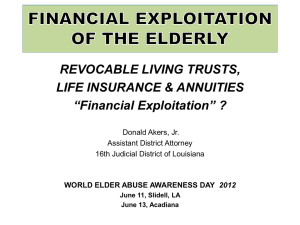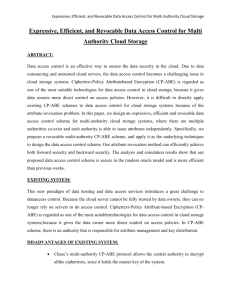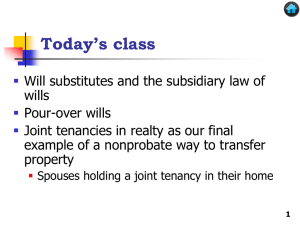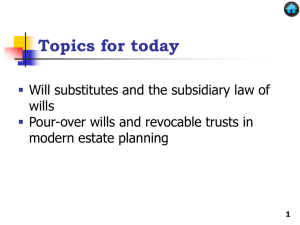TRANSFERRING ASSETS TO YOUR REVOCABLE TRUST
advertisement
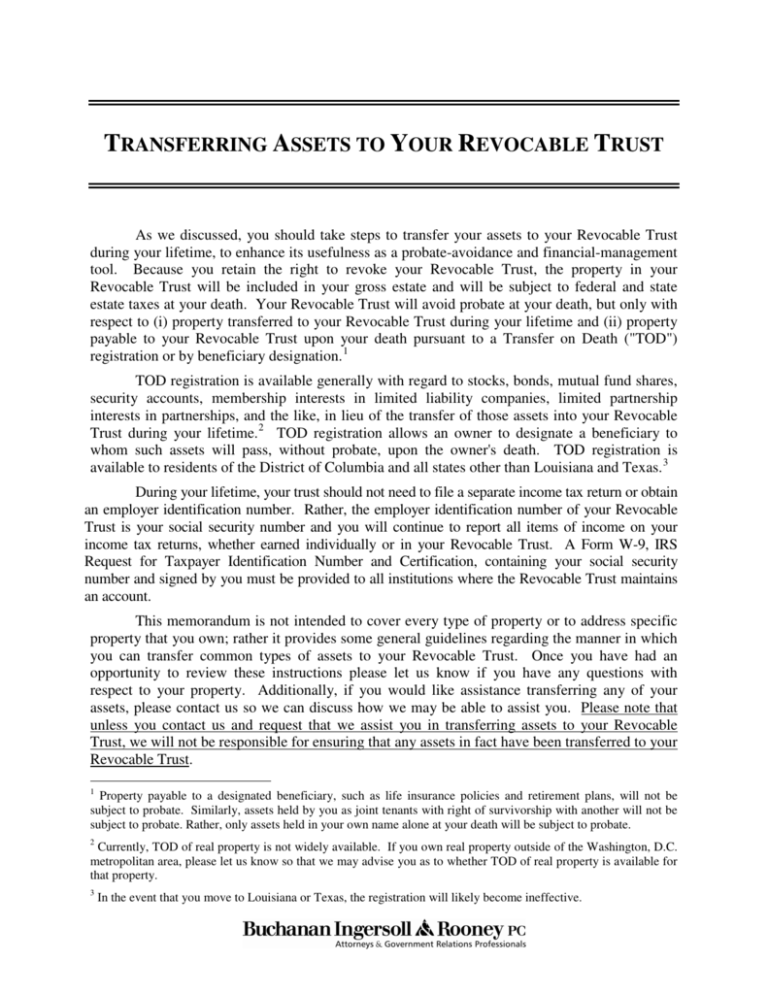
TRANSFERRING ASSETS TO YOUR REVOCABLE TRUST As we discussed, you should take steps to transfer your assets to your Revocable Trust during your lifetime, to enhance its usefulness as a probate-avoidance and financial-management tool. Because you retain the right to revoke your Revocable Trust, the property in your Revocable Trust will be included in your gross estate and will be subject to federal and state estate taxes at your death. Your Revocable Trust will avoid probate at your death, but only with respect to (i) property transferred to your Revocable Trust during your lifetime and (ii) property payable to your Revocable Trust upon your death pursuant to a Transfer on Death ("TOD") registration or by beneficiary designation. 1 F F TOD registration is available generally with regard to stocks, bonds, mutual fund shares, security accounts, membership interests in limited liability companies, limited partnership interests in partnerships, and the like, in lieu of the transfer of those assets into your Revocable Trust during your lifetime. 2 TOD registration allows an owner to designate a beneficiary to whom such assets will pass, without probate, upon the owner's death. TOD registration is available to residents of the District of Columbia and all states other than Louisiana and Texas. 3 F F F F During your lifetime, your trust should not need to file a separate income tax return or obtain an employer identification number. Rather, the employer identification number of your Revocable Trust is your social security number and you will continue to report all items of income on your income tax returns, whether earned individually or in your Revocable Trust. A Form W-9, IRS Request for Taxpayer Identification Number and Certification, containing your social security number and signed by you must be provided to all institutions where the Revocable Trust maintains an account. This memorandum is not intended to cover every type of property or to address specific property that you own; rather it provides some general guidelines regarding the manner in which you can transfer common types of assets to your Revocable Trust. Once you have had an opportunity to review these instructions please let us know if you have any questions with respect to your property. Additionally, if you would like assistance transferring any of your assets, please contact us so we can discuss how we may be able to assist you. Please note that unless you contact us and request that we assist you in transferring assets to your Revocable Trust, we will not be responsible for ensuring that any assets in fact have been transferred to your Revocable Trust. 1 Property payable to a designated beneficiary, such as life insurance policies and retirement plans, will not be subject to probate. Similarly, assets held by you as joint tenants with right of survivorship with another will not be subject to probate. Rather, only assets held in your own name alone at your death will be subject to probate. 2 Currently, TOD of real property is not widely available. If you own real property outside of the Washington, D.C. metropolitan area, please let us know so that we may advise you as to whether TOD of real property is available for that property. 3 In the event that you move to Louisiana or Texas, the registration will likely become ineffective. TRANSFERRING ASSETS TO YOUR REVOCABLE TRUST A. PAGE 2 Title When transferring assets to your Revocable Trust during your lifetime, we recommend that you title any property transferred to your Revocable Trust as follows: "[Trustee's name] (or successor trustee(s)), as Trustee of [Name of trust] u/a/d [Date of your Revocable Trust without regard to amendments]." TOD registration of assets held in your sole name may be effected by changing the ownership records to reflect your ownership interest as follow: "[Your name] TOD [Name of trust] u/a/d [Date of your Revocable Trust without regard to amendments]." If you are married and own any property by joint tenancies with rights of survivorship or tenancies by the entirety with your spouse, then during your joint lifetimes this property should be titled to transfer on death to the revocable trust of the spouse who is deemed to survive in the event of a common accident (generally, though not always, the wife). For example: With respect to joint tenancies with rights of survivorship, "[Husband] and [Wife] JTROS TOD [Name of Wife's Revocable Trust] u/a/d/ [Date of Wife's Revocable Trust without regard to amendments]." and With respect to tenancies by the entirety, "[Husband] and [Wife] T by E TOD [Name of Wife's Revocable Trust] u/a/d/ [Date of Wife's Revocable Trust without regard to amendments]." Upon the death of the first spouse, the ownership records for such property should be updated in the format for TOD registration of assets held in the sole name of the surviving spouse. There is no need for concern if a particular institution has a suggested format that differs slightly from the format we have recommended above. For example, using the designation of "u/a" (i.e., under agreement) instead of "u/a/d" (i.e., under agreement dated). This is simply a matter of style preference that will have no adverse consequences to you. However, if the institution insists on using a format that seems to vary greatly from our recommended format, please contact us prior to submitting the completed paperwork so that we may review the format. B. Tangible Personal Property (e.g., furnishings, artwork, jewelry and collectibles) The two methods by which items of tangible personal property can be transferred to your Revocable Trust are (i) a written assignment of the item to your Revocable Trust or (ii) placing the item in a safe deposit box naming the Trustee of your Revocable Trust as the owner. You executed an Assignment of Tangible Personal Property for the tangible personal property you own in your sole name at the time you executed your Revocable Trust. Note that jointly held tangible property and items that are titled through a government agency, such as cars and boats, are not covered by the Assignment. You should check with your homeowner's insurance company to make sure that your homeowner's insurance policy will cover tangible personal property transferred to your Revocable Trust or, if necessary, add the Trustee of your Revocable Trust as an additional insured under such policy. TRANSFERRING ASSETS TO YOUR REVOCABLE TRUST C. PAGE 3 Cash Accounts (e.g., Checking, Savings, Certificates of Deposit, Money Market Accounts) You should open a new account at the institution of your choice, naming the Trustee of your Revocable Trust as the owner, and transfer to that account the funds you currently hold in your individual name, "as is" rather than selling any assets (so as not to trigger adverse incometax consequences). The bank may request copies of the first and signature pages of the Revocable Trust to confirm that your Revocable Trust is in existence before opening an account. You, as Trustee, should sign the signature card so that you may sign checks. Alternatively, as discussed above, a TOD registration may be a possibility with regard to those assets. Forms for TOD registration are generally available directly from your financial institution. D. Real Property Real property that you own as a joint owner with rights of survivorship or tenancy by the entirety will pass to the surviving joint owner upon your death, by operation of law. You may transfer a real estate interest that you hold in your sole name, including a partial interest such as a tenancy in common interest, into your Revocable Trust. If you plan to acquire real estate outside of your state of domicile that you plan to hold on to, you should consider titling it in the name of your Revocable Trust to avoid the need for ancillary probate in the other state. The transfer to your Revocable Trust of real property can only be accomplished by executing and recording a deed naming the Trustee of your Revocable Trust as the owner. The deed should be prepared and recorded by an attorney. Prior to the transfer of any real property to your Revocable Trust, you should be aware of any transfer of title or recordation fees which may be assessed and you should ensure that your title insurance will not be impaired by the transfer. A new endorsement of your title insurance policy, adding the Trustee of your Revocable Trust as an additional insured, may be required. Some title companies will require that a new title insurance policy be issued in the name of the Trustee of your Revocable Trust. If you have a mortgage on your residence, transferring that property to your Revocable Trust should not trigger an acceleration of the outstanding indebtedness. If there is indebtedness on other real property, you will need to contact the holder of the indebtedness to obtain permission to transfer from you as an individual to you as Trustee of your Revocable Trust. As noted above, TOD of real property is not currently widely available. If you own real property outside of the Washington, D.C. metropolitan area, please let us know so that we may advise you as to whether TOD of real property is available for that property. E. Stocks and Bonds 1. Privately-Held Stocks or Bonds To transfer privately-held securities, such as stocks or bonds in privately-held corporations, you should contact the secretary of the corporation, who can assist you in preparing the necessary documentation. In the event that the secretary has any questions in connection with this transfer, we would be glad to speak to that individual upon your request. Alternatively, as discussed above, a TOD registration may be a possibility with regard to privately held stocks and bonds. You should make a request in writing to the secretary of the corporation. TRANSFERRING ASSETS TO YOUR REVOCABLE TRUST 2. PAGE 4 Publicly-Held Stock or Bonds To transfer publicly-held securities, such as stocks or bonds in publicly-held corporations, you should contact your stockbroker or the institution through which you purchased the securities, who can assist you in preparing the necessary documentation. Your stockbroker will generally require a photocopy of the first page and signature pages of your Revocable Trust, to ensure that the trust is in existence. The brokerage firm and/or transfer agent through whom the stockbroker effects the change may also require additional documentation. Alternatively, as discussed above, a TOD registration may be a possibility with regard to publicly-held stocks or bonds. The stockbroker or institution through whom you work should have forms for TOD registration. 3. Bearer Bonds Bearer bonds can be transferred to your Revocable Trust by a written assignment, or by placing the bonds in a safe deposit box naming the Trustee of your Revocable Trust as the owner. Alternatively, as discussed above, a TOD registration may be a possibility with regard to bearer bonds. Please contact us if you are interested in registering your Bearer Bonds in TOD format. F. Promissory Notes A promissory note, if assignable, can be transferred to your Revocable Trust by assigning the beneficial interest in the note to your Revocable Trust. If the note is secured, the security should also be assigned. Although the assignment of a promissory note is relatively uncomplicated, it should be done by an attorney to ensure compliance with applicable state law. Alternatively, as discussed above, a TOD registration may be a possibility with regard to promissory notes. G. Limited Partnerships and Limited Liability Companies A limited partnership interest or membership interest may be transferred to your Revocable Trust by a written assignment. If the interest is governed by a written agreement, the agreement should be reviewed to determine whether the interest is assignable and whether any consents are required prior to assignment. Additionally, state law must be reviewed to determine if any state filings are necessary. At your request, we can review the governing state law and the governing agreement and then prepare the necessary assignment. Alternatively, as discussed above, a TOD registration may be a possibility with regard to limited partnership interests. and membership interests TOD registration may be effected by making a request in writing to the general partner or manager, as the case may be, that the schedule for the written agreement, if any, and K-1s be changed to reflect your ownership in TOD format. Any written agreement should be reviewed to determine whether the trust would be a permissible limited partner or member, as the case may be, upon your death. H. Oil, Mineral and Gas Interests Oil, mineral, and gas interests can be quitclaimed to the Trustee of your Revocable Trust, and any existing leases can be assigned to your Revocable Trust. Title should reflect the name of the Trustee of your Revocable Trust to which the interest or lease is transferred. An attorney should prepare the necessary documents. TRANSFERRING ASSETS TO YOUR REVOCABLE TRUST I. PAGE 5 Retirement Plans You should contact the benefits department of the relevant company, the account holder or the plan administrator, to confirm that your current designated beneficiaries and contingent beneficiaries are in accordance with your dispositive wishes or, if not, to secure the proper form for designating new beneficiaries. Although a trust may be designated as the beneficiary on an account under a pension plan, IRA, Keogh or other retirement benefit under certain limited circumstances, we generally do not recommend that your Revocable Trust be designated as the beneficiary (or alternative beneficiary) of retirement plans, as this may trigger adverse tax consequences. If you wish to designate your Revocable Trust as the beneficiary of your retirement plans, please discuss it with us before any such designation is implemented. J. Life Insurance Policies on Your Life It is best to have life insurance policies on your life issued to (or transferred to) an irrevocable life insurance trust as a means of having the proceeds excluded from your taxable estate at your death (note that, in the case of pre-existing policies transferred to an irrevocable life insurance trust, you must survive the transfer of the policy by three years in order for the proceeds to be excluded from your taxable estate at your death). Nevertheless, if you do not mind having the proceeds payable upon your death included in your taxable estate at your death, life insurance policies may reflect your Revocable Trust as the primary or alternative beneficiary, changing the designated beneficiary to the Trustee of your Revocable Trust. Life insurance proceeds payable to a designated beneficiary will not be subject to probate; accordingly, transferring title to your Revocable Trust is not necessary to avoid probate. TAX ADVICE DISCLAIMER: Any federal tax advice contained in this communication (including attachments) was not intended or written to be used, and it may not be used, by you for the purpose of (1) avoiding any penalty that may be imposed by the Internal Revenue Service or (2) promoting, marketing or recommending to another party any transaction or matter addressed herein. If you would like such advice, please contact us. 331591
